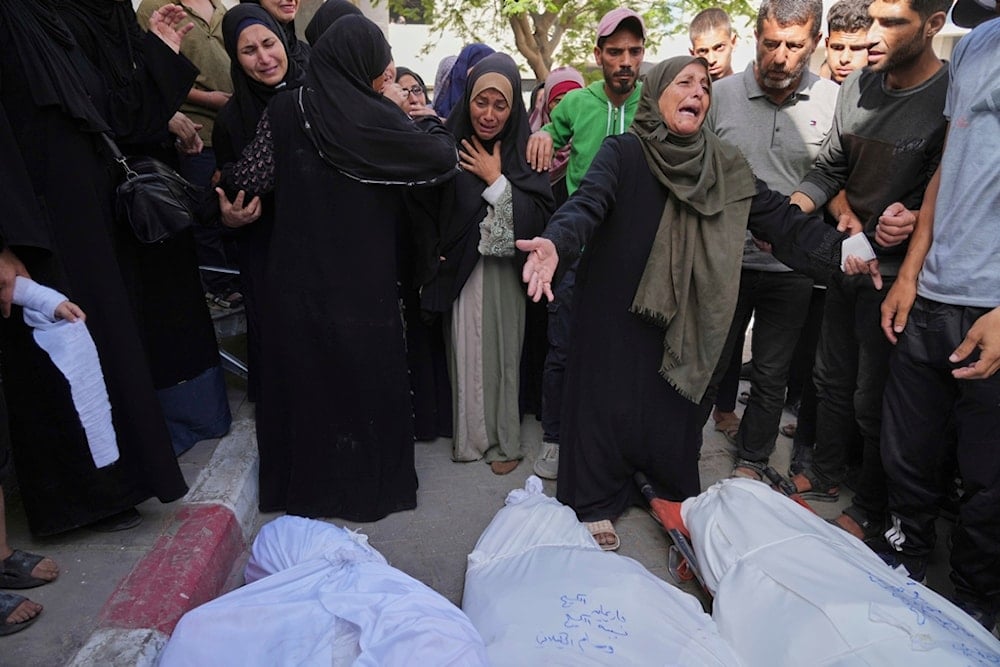West shifts tone on Gaza, but action remains absent: The Guardian
Nesrine Malek critiques the West's delayed condemnation of "Israel's" actions in Gaza, arguing that words without decisive action reflect complicity and moral failure.
-

Palestinians mourn over the bodies of their relatives who were killed when an Israeli military strike hit a school sheltering displaced residents, at Al-Shifa Hospital in Gaza City, Monday, May 26, 2025 (AP Photo/Jehad Alshrafi)
Sudanese writer and journalist Nesrine Malek, in an opinion piece published in The Guardian on Tuesday, examined the recent shift in tone among Western governments regarding "Israel's" prolonged assault on Gaza, questioning why it has taken nearly two years of visible devastation for such change to occur.
For 19 months, Israeli military actions in Gaza, openly acknowledged and often justified by Israeli officials, have drawn international concern but little in the way of concrete opposition. Malek notes that the new language coming from countries like the UK and members of the European Union marks a distinct departure from earlier statements that largely stressed "Israel's" so-called right to self-defense. Now, officials are calling "Israel's" conduct "morally unjustifiable" and "wholly disproportionate," while labeling the threats made by Israeli leadership as "abhorrent."
According to Malek, this apparent pivot is driven partly by an attempt to pre-empt accountability. "The war has amounted to genocide and ethnic cleansing in ways that are increasingly undeniable, indefensible and unspinnable," she wrote. While governments once tried to defend or downplay "Israel's" operations, the sheer scale of destruction has made such arguments politically and socially untenable.
Symbolic Reckoning
Despite this rhetorical change, Malek argues that meaningful consequences remain absent. "Words alone mean nothing. They simply bounce off Israel's iron dome of impunity," she writes, criticizing the failure of international institutions to enforce their own findings and rulings. She describes a climate in which war crimes are committed openly, yet met only with symbolic rebukes.
The Israeli regime, she asserts, not only ignores these condemnations but uses them to reinforce its sense of isolation and righteousness. Malek writes that "Israel, as one British media ally lamented, has hung its friends out to dry," leaving them unable to justify the continued support of its actions.
Read more: Germany decries Gaza toll while fueling war with weapons to 'Israel'
This moment, though seemingly pivotal, is fraught with contradictions. While global awareness of the Palestinian plight has grown, with protests and public discourse increasingly centered around Gaza, Malek cautions against overestimating the impact of these shifts. "Palestine, once a marginal issue, has become a mainstream one that lies at the heart of western politics and discourse," she notes, but adds that awareness without action has failed to prevent or mitigate the violence.
Moral Collapse
She highlights the brutal conditions in Gaza today, widespread hunger, civilian deaths, and total devastation, as a moral breaking point. "To deprive people of food, to have such power over them, is not a military campaign of strategic goals involving regrettable collateral damage – it is the creation of a ghetto of mass punishment," she writes.
The slow response from "Israel's" allies, she suggests, reveals deeper systemic fears, of disrupting alliances, of damaging long-held narratives about "Israel" as a democratic stabilizer, and of confronting the uncomfortable realities of its policies. Yet those narratives, Malek argues, have already been undone by Israel's own conduct. "It has upended regional and global political and moral settlements, and its allies have still not caught up."
Read more: Gaza humanitarian crisis 'intolerable', Macron says
She calls for a more forceful international response, proposing that trade embargoes, sanctions targeting political leaders, enforcement of international criminal court decisions, and a diplomatic blockade are among the measures that should be taken. "A blockade should be enforced, one that establishes in practice the pariah status that the Israeli government has long ago earned in principle," she writes.
Delayed Accountability
Still, Malek concludes that even such actions would only scratch the surface of what is needed, and would come far too late. The political excuses used to justify inaction, maintaining influence over "Israel", fears of emboldening Iran, or honoring historic allegiances, no longer hold weight in a world already transformed by the consequences of delay.
"Palestinians, from Gaza to the West Bank, are paying the highest price for inaction," she warns, "but an acute wound has been inflicted on the rest of the world. If nothing happens, its moral and political morbidity will encompass all."

 4 Min Read
4 Min Read










